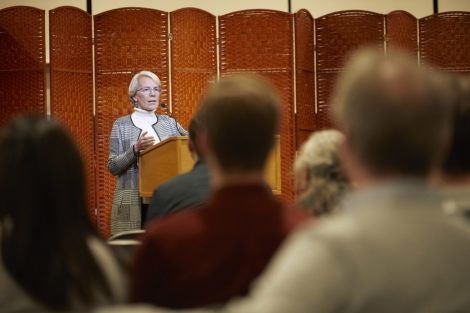November 25, 2019—During development of the 2015–2020 Dietary Guidelines for Americans (DGA), scientists on its advisory committee tried unsuccessfully to add a focus on sustainability. The committee member who spearheaded the effort, Miriam Nelson, professor emerita at the Friedman School of Nutrition Science and Policy at Tufts University, recently spoke at Harvard T.H. Chan School of Public Health about the urgent need to consider the health of the environment in nutrition policy.
Nelson delivered her remarks at the Department of Nutrition’s 15th annual Stare Hegsted lecture, held at the School on November 14.
The global food system makes a significant contribution to climate change, according to Nelson, accounting for more than 70% of fresh water use, up to 30% of human-generated greenhouse gas emissions, and 80% of deforestation—and consequently jeopardizes the availability and healthiness of staple foods. To protect the health of future generations and the planet, Nelson said, “This is the moment to be doing this work.”
The DGA, published every five years by the U.S. Department of Health and Human Services and the U.S Department of Agriculture, provides policy guidelines for federal programs such as the Supplemental Nutrition Assistance Program (SNAP) and the School Lunch Program, and influences trends in the food manufacture and restaurant industries.
Nelson led the 2015–2020 DGA Advisory Committee’s sustainability subcommittee, which concluded in its report that plant-based dietary patterns promote greater health and have less negative impact on the environment than the current average U.S. diet. Its recommendation to reduce red and processed meat consumption drew backlash from the meat industry. Ultimately, Secretary of Agriculture Tom Vilsack and Secretary of Health and Human Services Sylvia Burwell omitted sustainability from the final DGA, stating that it is beyond the scope of its mission.
Pushing back during her remarks, Nelson said that food security has always been part of the DGA. She said, “You can’t have food security without a sustainable diet. Therefore, food sustainability is in scope.”
Nelson and her colleagues on the subcommittee, including Frank Hu, Fredrick J. Stare Professor of Nutrition and Epidemiology and chair of the Department of Nutrition at Harvard Chan School, later published an updated version of the study that informed the Advisory Committee’s report.
In the absence of federal government action, Nelson called on researchers to continue to build the case for sustainability’s inclusion in nutrition policy from a scientific, public health, and business perspective.
She noted that a number of other countries around that world, including Brazil and Germany, have added a focus on sustainability to their own dietary guidelines. Nelson highlighted the simple message summarized by the Swedish National Food Agency: “Find your way to eat greener, not too much, and be active.”
Photos: Kent Dayton
